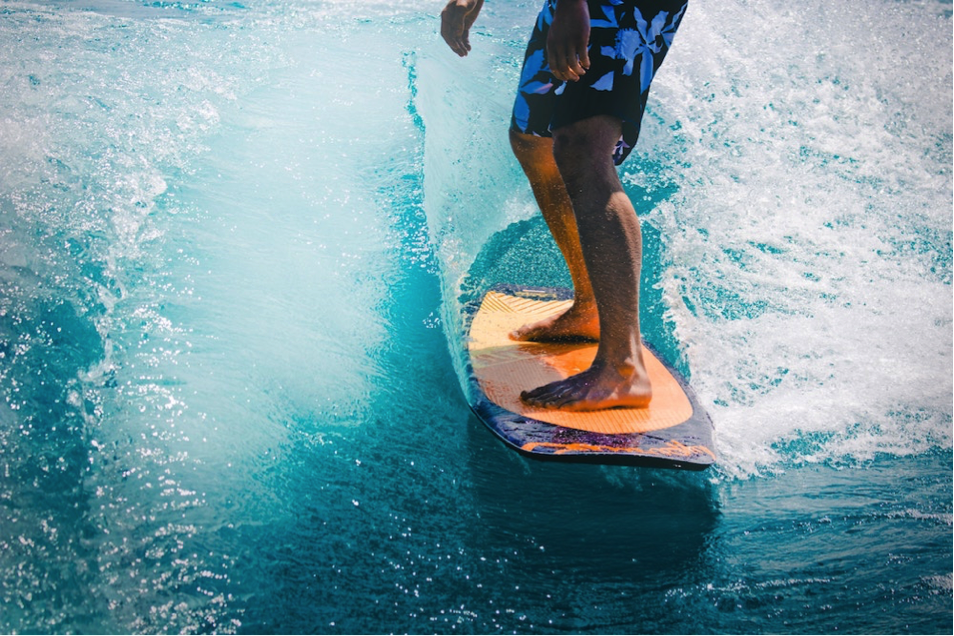
Image Source: Unsplash
Wouldn’t it be wonderful if we could go back to the invention of surfing and watch the very first man or woman to ever stand up on a wave?
The truth is, we don’t know when surfing first began, though it likely originated in both Peru and Polynesia. The first recorded surf experience was in 1767 and the sport is still beloved today.
Between the exhilarating experience of riding a wave to the hours spent on gorgeous beaches, it’s no wonder why surfers can’t wait to get out on their boards.
Physical Benefits of Surfing
Surfing is fun, exciting and challenging. There are all sorts of physical benefits you’ll reap from surfing, whether you’re a beginner or experienced.
- Builds Muscle: Surfers use a ton of different muscles to stay balanced and in control when out in the ocean, not to mention all that swimming they have to do. Basically, your muscles will get a workout from head-to-toe. To become an even better surfer, add strength training to your regular workout routine.
- Improves Heart Health: Surfing is a fantastic form of cardio. According to the Mayo Clinic, your aim should be 30 minutes of cardio activity most days a week. Cardio will strengthen your heart and help to prevent heart disease and high blood pressure.
- Dose of Vitamin D: While you can get Vitamin D from certain foods, there’s no better source than the sun. Even when you’re protected by sunblock, your body will still absorb healthy Vitamin D from the sun. You’ll then be better able to absorb calcium, which will strengthen your bones.
- Boosts Energy: Surfing can improve your mood on an emotional level, but it can also physically change your attitude by releasing endorphins, which increase your energy and make you feel more alive.
Mental Benefits of Surfing
Surfing is excellent for building a strong, fit body, but it has numerous emotional and mental benefits as well.
- Clears Your Mind: When you’re surfing, you have to concentrate on what’s happening in the moment. This can clear your mind of everything else that usually distracts you. After an afternoon of surfing, you may feel as rejuvenated as you do following a traditional therapy session.
- Improves Self-Awareness: Surfing requires just as much mental focus as it does physical strength, which can help create more of a mind-body connection. You’re forced to face your limitations and use your strengths, which can advance your emotional intelligence.
- Decreases stress: Surfing and other types of exercise can do wonders when it comes to lowering stress levels, for young people and adults alike. If you only get out on the waves once in a while, make sure to engage in other types of exercise throughout the week to maintain those stress-busting perks.
- Combats serious mental difficulties: Research suggests that surfing can help with deeper emotional and mental issues, like anxiety, insomnia, depression, and PTSD.
How to Surf Year-Round
Even if you’re lucky enough to live close to the ocean, cold weather can mean the end of the surfing season. When temperatures dip to 30 degrees Fahrenheit or below, it takes a lot of willpower to set foot in the water wearing just a bathing suit. That doesn’t mean you have to hang up your surfboard until spring or summer, though.
- Get the Right Gear: Invest in a 5mm neoprene wetsuit and don’t be afraid to pay a high price – you need to stay warm, dry and safe when surfing in cold weather, so make sure you’re check out the best winter wetsuits you can find.
- Prevent Dry, Chapped Skin: Protect your skin and your lips by liberally applying moisturizer and Vaseline. Even though it’s cold, the sun will be out, so make sure that whatever you use has SPF in it.
- Warm Up: Spend a few minutes on the beach warming up with stretching and light exercises. When you get into the cold water, your body is going to naturally reduce blood flow, so you need to get yourself warm before that happens to limit heat loss.
- Keep moving: One of the most important things to remember when surfing in the cold is to keep moving. Even as you’re sitting on your board waiting for the next wave, move your shoulders up and down, stretch your neck, etc. The idea is to keep your blood pumping so your body stays as warm as possible.
Surfing is so much more than just an adventurous outing. It’s a fantastic sport with numerous health benefits, whether you want to get yourself physically into shape or you want to tone up your mental health. With the right gear and a healthy dose of risk-taking, you’ll improve everything from your strength to your sleep routine once you become a surfer.



Nice article. This is outstanding.
My sister would like to try surfing this year, and that is why she’s thinking of taking up lessons so her skill will be improved further. Well, you made a pretty good point that she should know how to move her shoulders up and down during surfing. Thank you for sharing here as well that this sport may help reduce the blood flow of an individual.
It’s great that you talked about how surfing is a fantastic form of cardio. I haven’t been doing many physical activities lately, so I am thinking of exercising soon. I want to have some fun while exercising, so I am planning on going scenic river surfing.